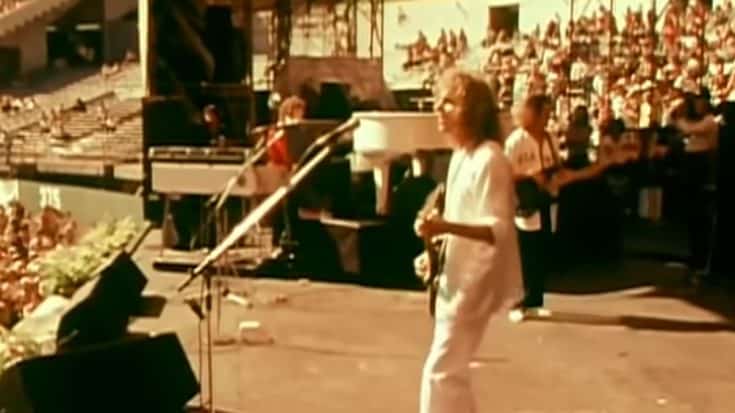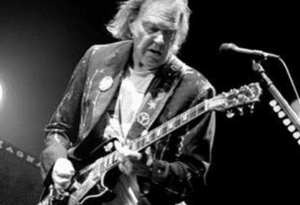5 Best Unpopular Songs From Peter Frampton

via PeterFramptonOnMV / YouTube
Although the pantheons of classic rock is populated with iconic bands, Peter Frampton’s name and career is one of those that resonates with a special kind of reverence. Hits like “Show Me the Way” and “Baby, I Love Your Way” made him an iconic live performer, and their melodies have echoed through generations of music lovers.
Although his solo journey took some time to gain momentum, it wasn’t until the release of the iconic live album, Frampton Comes Alive! in 1976, that he skyrocketed to superstardom. This landmark release drew attention to the exceptional work he had been quietly crafting for years.
Yet, the true allure of Frampton’s musical journey often lies in the shadows, in those lesser-known treasures that deserve their moment in the sun. In this deep dive into the heart of Frampton’s artistry and through the soul of his music, let’s unravel the hidden gems that have quietly enriched his illustrious career.
https://twitter.com/ClassicAlbumArt/status/1716943269039583294
1. “Alright” (Wind of Change, 1972)
“Alright”, a gem nestled within Peter Frampton’s 1972 album Wind of Change, is a timeless prelude to his illustrious musical legacy. This track ushers us into the classic rock elegance that defines Frampton’s style. With the opening guitar riff, it immediately envelopes us in a nostalgic aura. Here, we encounter the signature talk box guitar technique that would later become iconic in Frampton’s repertoire, laying the foundation for a sonic journey.
Frampton launched his debut solo album at 22, though he had already tasted success with Humble Pie and solidified his reputation as a sought-after session musician for some of the biggest names in rock and roll.
In “Alright”, the final track of Wind of Change, he received assistance from noteworthy individuals with ties to the most prominent band of all time. Ringo Starr took the drumming helm for the track, and prominent figures in the Beatles’ circle, such as Klaus Voorman on bass and Billy Preston on keyboards, also joined the the budding solo rocker’s first record.
What truly makes “Alright” remarkable is the hidden magic within its structure. The heart of the song lies in the mesmerizing guitar solo, a narrative of emotion conveyed through the strings. Frampton’s guitar work creates this sonic experience that captivates the senses, each note resonating with the artist’s soul.
2. “I Got My Eyes on You” (Frampton’s Camel, 1973)
“I Got My Eyes on You”, from Peter Frampton’s 1973 album Frampton’s Camel, embarks on a bluesy odyssey, radiating a raw and unfiltered quality that attests to Frampton’s musical versatility. The track unveils itself with emotive guitar solos that take center stage, weaving a story that showcases the soulful depth of Frampton’s artistry.
For his second album, Frampton made a deliberate shift, opting for a more consistent backing band instead of relying on various session musicians throughout the record. This strategic choice immediately bore fruit, evident right from this opening track of Frampton’s Camel.
The album also underscores Frampton’s clear affinity for the funk sounds that permeated the musical landscape during that period. The prominent use of the clavinet, skillfully handled by the versatile Frampton and generously infused throughout “I Got My Eyes on You”, produces a groove that gave the love song a rawer and more substantial quality than your typical romantic ballad.
“I Got My Eyes on You” unearths the grit and authenticity of Frampton’s legendary solo journey. The track provides a glimpse into uncharted territories of his music, inviting listeners to experience the depth of his sonic palette. Frampton’s guitar solos, brimming with passion and intensity, offer an immersive experience that speaks to his blues influences.
3. “Apple of Your Eye” (Frampton, 1974)
“Apple of Your Eye” is a captivating chapter in Peter Frampton’s solo success, found in his self-titled album released in 1974. This track weaves a melodious charm, enticing listeners with its catchy guitar hooks and heartfelt lyrics. It gives shape to Frampton’s ability to create music that takes his audience on a journey through the corridors of his artistic expression.
Peter Frampton’s musical style underwent subtle evolution as the 1970s unfolded, gradually gravitating toward a more tightly woven, melodically driven rock foundation with the release of Frampton.
This album largely bore the hallmark of a do-it-yourself effort, with Frampton taking on the role of a multi-instrumentalist, contributing to every facet except the bass, deftly provided by Andy Brown, and the drums, skillfully handled by John Siomos.
“Apple of Your Eye” has become a testament to the guitarist’s ability to capture the essence of a moment in his music. With catchy hooks, heartfelt storytelling, and a timeless quality, this track invites us to explore the depths of his artistry that continues to stand the test of time.
4. “Won’t You Be My Friend” (I’m in You, 1977)
“Won’t You Be My Friend”, a standout track from Peter Frampton’s 1977 album I’m in You, invites us into an introspective musical world. The song exudes a mellow and reflective atmosphere, painting a picture of emotional depth. Frampton’s vocals are tender and poignant, setting the stage for a journey through nostalgia and warmth.
Capitalizing on the momentum generated by his iconic live album’s breakout success, Frampton seized the opportunity with the subsequent I’m in You. In crafting the record, Frampton revisited two musical styles he had somewhat set aside: the funk-infused grooves and the extended song durations, with “Won’t You Be My Friend” spanning over eight minutes.
Despite its length, “Won’t You Be My Friend” never relinquishes its irresistible groove. It comes as no surprise that the track left a lasting impression, with its rhythms even finding their way into Will Smith’s “Parents Just Don’t Understand”.
More than just a token introspective track, “Won’t You Be My Friend” is an intimate invitation to explore the sentiments and emotions that lie beneath the surface of Frampton’s music. Its gentle, introspective nature makes it a timeless piece, beckoning us to revisit the artist’s work and rediscover the power of music to evoke deep emotions and memories.
5. “It’s a Sad Affair” (Where I Should Be, 1979)
“It’s a Sad Affair”, a remarkable composition from Frampton’s 1979 album Where I Should Be, unfolds a poignant soundscape. The track delicately weaves intricate guitar work with heartfelt lyrics, delivering a masterclass in musical storytelling. Frampton’s artistry shines through as he takes us on an emotional journey, evoking deep sentiments.
A few years after Frampton Comes Alive!, the solo rocker’s reputation took a hit due to his involvement in the ill-fated film Sgt. Pepper’s Lonely Hearts Club Band, and a significant setback occurred in 1978 when he was involved in a serious car accident, further impeding his career’s momentum.
When he made his comeback with Where I Should Be in 1979, the buzz that once surrounded him had significantly dissipated. The album, in general, carries a more understated tone. However, it’s the closing track that shines as it unveils a different facet of Frampton’s artistry. In “It’s a Sad Affair”, he fully immerses himself in the persona of a soulful crooner, pouring his heart into the lament of a spent relationship.
“It’s a Sad Affair” becomes an immersive experience that delves into the emotional intricacies of Frampton’s work. Its combination of poignant lyrics and intricate guitar melodies provides a unique insight into the depths of his musical soul. The track stands as a testament to his commitment to crafting timeless, emotionally resonant music that continues to move and captivate audiences even decades later.
















